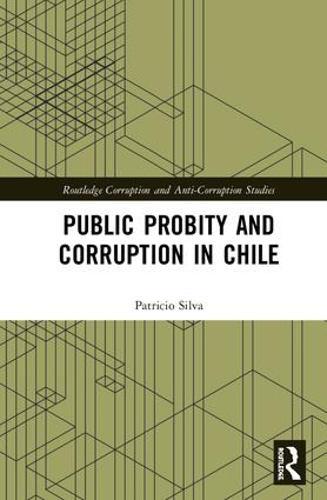Overview
In most Latin American countries, key officials and political figures have been involved in big corruption scandals in the last decade, leading to a rigorous academic debate on the possible socio-economic, political and cultural factors responsible for corrupt practices across the region. This book takes a different approach by focusing on Chile, which shows the lowest levels of corruption in the region. Instead of analysing notoriously bad cases in Mexico, Argentina, Brazil and Venezuela, this book explores the factors which have led to a relatively high degree of public probity among power holders in Chile. Public Probity and Corruption in Chile presents a long-term historical analysis demonstrating that public probity in Chile has its roots in the colonial period, and that public and state responses have historically shown a low level of tolerance for public cases of corruption. In particular, the author highlights the role played by relative poverty and lack of resources, geographical remoteness, the impact of the Arauco War against the Mapuche people, the militarisation of both government and public administration, the extreme oligarchic nature of the Chilean aristocracy, the early consolidation of state institutions and the rule of law, high levels of political stability and the role played by patriotism. Studying an example of better practice in detail in this way provides valuable insights into the factors and actors which can help to prevent or to revert the phenomenon of public corruption in the region more generally. As such, this book will be of interest to researchers of corruption and public probity both in Chile and further afield.
Full Product Details
Author: Patricio Silva
Publisher: Taylor & Francis Ltd
Imprint: Routledge
Weight: 0.589kg
ISBN: 9781138331167
ISBN 10: 1138331163
Pages: 246
Publication Date: 30 May 2019
Audience:
College/higher education
,
Tertiary & Higher Education
,
Undergraduate
Format: Hardback
Publisher's Status: Active
Availability: In Print

This item will be ordered in for you from one of our suppliers. Upon receipt, we will promptly dispatch it out to you. For in store availability, please contact us.
Reviews
It is commonplace to cite Chilean exceptionalism as part of any analysis of variance in the governance of Latin America states. Patricio Silva has produced an encyclopaedic analysis of how the Chilean state was able to maintain a fairly clean administration (with some exceptions). This book provides both a historical guide and a sociological analysis explaining the trends and the exceptions, and should be required reading for students of Chile and of the state in general. -- Miguel Angel Centeno, Musgrave Professor of Sociology, Princeton University, USA When one looks at Chile from a comparative perspective, one of the country's main mysteries are its relatively low levels of corruption. Cases which in the rest of Latin America are considered to be small acts of naughtiness or cleverness, that can even produce admiration, in Chile they constitute real scandals which offend the idea Chileans have of themselves. Chile seems to have a culture of probity, a certain allergy towards corruption which constitutes an exception in Latin America. Where does that culture of probity from? Patricio Silva provides an answer to that question by exploring its origins in colonial Chile and its long evolution up to the present. -- Carlos Pena, Professor and Rector of Universidad Diego Portales, Chile
""It is commonplace to cite Chilean exceptionalism as part of any analysis of variance in the governance of Latin America states. Patricio Silva has produced an encyclopaedic analysis of how the Chilean state was able to maintain a fairly clean administration (with some exceptions). This book provides both a historical guide and a sociological analysis explaining the trends and the exceptions, and should be required reading for students of Chile and of the state in general."" -- Miguel Angel Centeno, Musgrave Professor of Sociology, Princeton University, USA ""When one looks at Chile from a comparative perspective, one of the country’s main mysteries are its relatively low levels of corruption. Cases which in the rest of Latin America are considered to be small acts of naughtiness or cleverness, that can even produce admiration, in Chile they constitute real scandals which offend the idea Chileans have of themselves. Chile seems to have a culture of probity, a certain allergy towards corruption which constitutes an exception in Latin America. Where does that culture of probity come from? Patricio Silva provides an answer to that question by exploring its origins in colonial Chile and its long evolution up to the present."" -- Carlos Peña, Professor and Rector of Universidad Diego Portales, Chile
It is commonplace to cite Chilean exceptionalism as part of any analysis of variance in the governance of Latin America states. Patricio Silva has produced an encyclopaedic analysis of how the Chilean state was able to maintain a fairly clean administration (with some exceptions). This book provides both a historical guide and a sociological analysis explaining the trends and the exceptions, and should be required reading for students of Chile and of the state in general. -- Miguel Angel Centeno, Musgrave Professor of Sociology, Princeton University, USA When one looks at Chile from a comparative perspective, one of the country's main mysteries are its relatively low levels of corruption. Cases which in the rest of Latin America are considered to be small acts of naughtiness or cleverness, that can even produce admiration, in Chile they constitute real scandals which offend the idea Chileans have of themselves. Chile seems to have a culture of probity, a certain allergy towards corruption which constitutes an exception in Latin America. Where does that culture of probity come from? Patricio Silva provides an answer to that question by exploring its origins in colonial Chile and its long evolution up to the present. -- Carlos Pena, Professor and Rector of Universidad Diego Portales, Chile
Author Information
Patricio Silva is Full Professor of Modern Latin American history at the Department of Latin American Studies, Leiden University, Leiden, The Netherlands.



